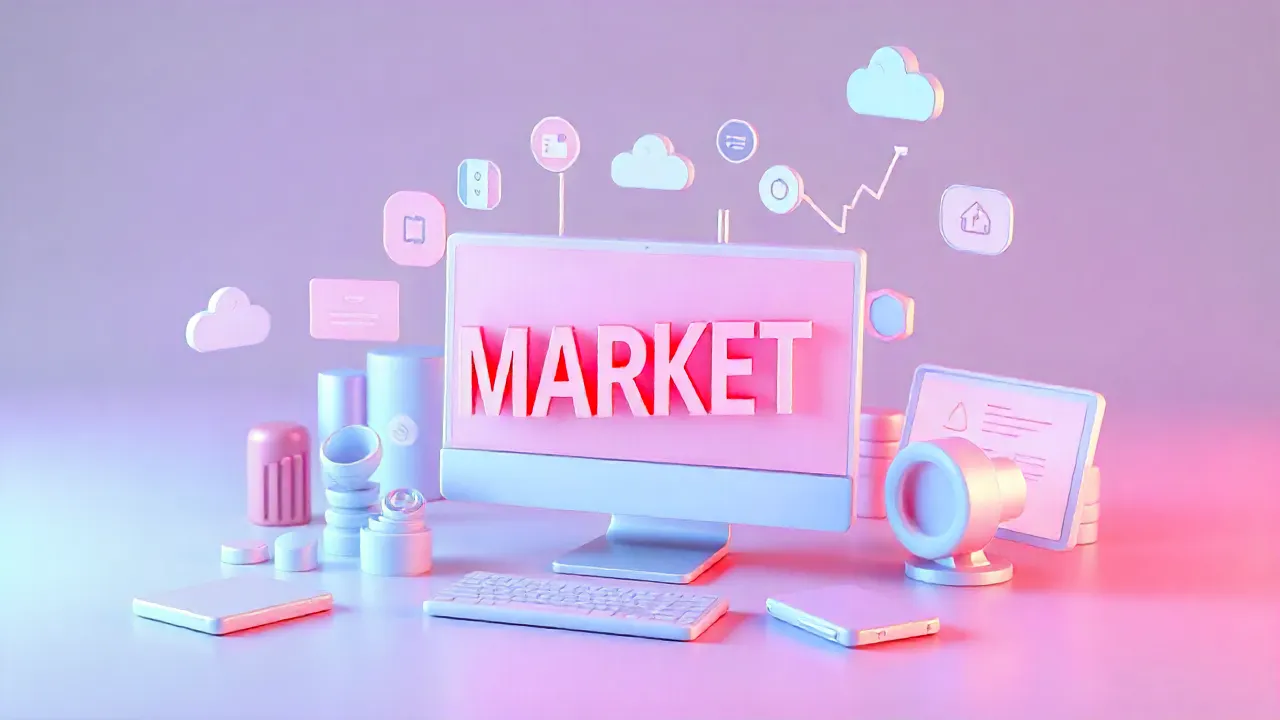Imagine walking into a store where a robot greets you, knows your preferences, and suggests products as if it’s read your mind. This could be the future of shopping, but what about the world of online marketing? With AI tools stepping up, we're at a crossroads where the lines between efficiency, personal touch, and ethical considerations have begun to blur. Let's explore this surprising new world.

The Rise of AI: Welcome to Marketing's New Frontier
Artificial intelligence (AI) is no longer just a futuristic concept. It's here, and it's shaking up the world of marketing. But how did we get here? Let's explore the fascinating integration of AI into marketing campaigns.
How AI Has Integrated into Marketing Campaigns
Imagine a world where your marketing strategies are not just based on gut feelings but on data-driven decisions. This is the new reality with AI in marketing. Companies are leveraging AI tools to analyze consumer behavior, predict trends, and personalize experiences.
-
Data Analysis : AI can process vast amounts of data quickly. It identifies patterns that humans might miss. For instance, AI can analyze customer interactions on social media to determine what type of content resonates best.
-
Personalization : Ever received an email that felt tailor-made for you? That's AI at work. It helps marketers create personalized messages based on user preferences and past behaviors.
-
Automation : AI automates repetitive tasks. This means marketers can focus on creative strategies rather than mundane tasks. Imagine not having to send out thousands of emails manually!
But there's more! AI tools are not just about efficiency. They also enhance creativity. For instance, AI can suggest the best times to post on social media or even generate content ideas based on trending topics. It's like having a super-smart assistant who never sleeps!
Examples of Successful AI Tools Currently Available
Now, let's dive into some successful AI tools that are making waves in the marketing world:
-
HubSpot: This platform uses AI to optimize marketing campaigns. It helps identify leads and tailor content to specific audiences. HubSpot’s AI tools can even analyze customer interactions to recommend the best follow-up actions.
-
Marketo: This tool specializes in automation. It streamlines marketing processes and helps businesses engage with customers more effectively. Marketo’s AI features analyze user behavior to improve targeting.
-
Canva: Yes, even design tools are getting in on the AI action! Canva uses AI to suggest design elements and layouts based on the user’s preferences. It’s like having a design guru at your fingertips.
These tools are just the tip of the iceberg. With AI, the possibilities are endless. But with great power comes great responsibility. Are we using these tools ethically? That's a question worth pondering.
A Personal Anecdote
Let me share a little story. A few months back, I was working on a marketing campaign for a local business. I decided to use an AI tool to analyze customer feedback. To my surprise, it uncovered insights I hadn’t even considered. It suggested changes to our messaging that led to a 30% increase in engagement! I felt like a marketing wizard. Who knew AI could be so magical?
But then I thought, is it ethical to rely so heavily on AI? What happens to the human touch in marketing? These are questions we must grapple with as we embrace this technology.
As we move forward, the integration of AI in marketing will continue to evolve. It’s a thrilling time to be in the field. With the right balance of automation and human creativity, the future looks bright for marketers who harness the power of AI.
Benefits of AI in Marketing: The Silver Linings

Artificial intelligence (AI) is not just a buzzword anymore; it’s a game-changer in the world of online marketing . Imagine a world where your marketing strategies are not only smarter but also more effective. Sounds like a dream, right? Well, thanks to AI, that dream is becoming a reality. Let's dive into the major benefits that AI brings to the marketing table.
1. Enhanced Customer Insights Through Data Analysis
Ever tried to read a book upside down? That’s how traditional marketing feels without data analysis. AI tools can analyze vast amounts of customer data in seconds. This means businesses can understand their customers better than ever before.
AI helps in identifying patterns in customer behavior.
-
It allows for segmentation of customers based on their preferences.
With AI, marketers can predict future buying behaviors.
For instance, let’s say a local bakery uses AI to analyze customer purchases. They find that on weekends, people prefer chocolate croissants. Who knew? This insight helps them stock more chocolate croissants, leading to happier customers and increased sales. As the famous marketing guru Philip Kotler said, “Marketing is no longer about the stuff you make, but about the stories you tell.” AI helps tell those stories better.
2. Real-Time Analytics and Decision Making
In the fast-paced world of marketing, waiting for reports can feel like watching paint dry. With AI, real-time analytics is at your fingertips. Imagine being able to tweak your marketing campaign on the fly, like adjusting the seasoning in a soup. Too salty? Add some sugar! Too bland? A sprinkle of spice!
Real-time data allows marketers to:
Monitor campaign performance instantly.
Adjust strategies based on immediate feedback.
Identify trends as they happen.
This level of responsiveness can significantly enhance the effectiveness of a marketing campaign. For example, if an online ad is underperforming, AI can alert marketers to make changes before too much money is wasted. It’s like having a marketing assistant who never sleeps!
3. Reduced Costs and Increased Campaign Effectiveness
Let’s face it: marketing budgets can be as tight as a pair of jeans after Thanksgiving dinner. AI can help trim those costs while boosting effectiveness. How? By automating repetitive tasks.
-
AI tools can handle customer service inquiries through chatbots .
-
They can optimize ad placements, ensuring your budget is spent wisely.
Automation allows for personalized marketing at scale.
Imagine a small business that uses AI to send personalized emails to customers. Instead of spending hours crafting each message, they can automate the process. The result? More time, less stress, and a higher return on investment. As the saying goes, “Work smarter, not harder.”
However, with great power comes great responsibility. Ethical AI is a crucial consideration in this landscape. Companies must ensure they use AI responsibly, respecting customer privacy and avoiding manipulation. After all, nobody wants to feel like they’re being watched by a hawk while shopping online.
In summary, the benefits of AI in marketing are clear: enhanced customer insights, real-time analytics for better decision-making, and reduced costs with increased campaign effectiveness. With these advantages, businesses can not only survive but thrive in the competitive marketing landscape. So, are you ready to embrace the future of marketing?
The Flip Side: Potential Drawbacks and Concerns
600×338 webp

As we dive deeper into the world of AI in marketing , it's essential to take a step back and examine the potential drawbacks. Yes, artificial intelligence can streamline processes and improve efficiency, but it also comes with its own set of challenges. Let's explore these concerns in a light-hearted yet insightful manner.
1. Over-reliance on AI: The Human Touch is Missing
Imagine a world where every interaction is automated. Sounds futuristic, right? But what happens when we lean too heavily on AI tools in marketing? The answer is simple: we risk losing the human touch.
When marketers rely solely on automation, they might forget what makes a brand truly resonate with its audience. Personal connections matter. Sure, AI can analyze data and predict trends, but can it understand the emotional nuances of a heartfelt message? Probably not.
Consider this: Have you ever received a generic email, one that felt more like a robot was writing to you than a real person? It's like getting a birthday card from your dentist. Sure, it's nice, but it lacks warmth. When brands overly depend on AI, they may end up sounding robotic, losing that vital human element.
2. Data Privacy: The Elephant in the Room
Next up, let’s talk about data privacy. In the age of online marketing , companies collect vast amounts of data. And with great data comes great responsibility. But how are these companies handling it?
Many organizations claim to prioritize user privacy. Yet, some still fall short. Recent scandals have shown that mishandling data can lead to significant backlash. Just think about the last time a major company faced a data breach. It’s like finding out your favorite ice cream shop has been using expired ingredients. Yikes!
Consumers are becoming increasingly aware of their data rights. They want transparency. If companies don’t address these concerns, they risk losing trust. And in marketing, trust is everything. So, how can businesses ensure they are practicing ethical AI ? By being upfront about data usage and respecting consumer privacy.
3. AI Failures: Lessons Learned
Even the best AI tools can stumble. There have been notable instances where marketing campaigns went awry, leading to embarrassing outcomes. For example, a well-known brand once used AI to generate social media content. The result? A series of posts that were hilariously off-brand. Think of it as a cat trying to bark. It just doesn’t work!
These failures highlight the importance of human oversight in AI-driven campaigns. While AI can analyze data and create content, it doesn’t always capture the essence of a brand. Brands must learn from these missteps. They need to find a balance between automation and human creativity.
In conclusion, while AI has revolutionized online marketing , it’s crucial to remain aware of its drawbacks. Over-reliance on AI can lead to a loss of the human touch. Data privacy issues must be addressed transparently. And, of course, learning from AI failures can help brands navigate the complex landscape of marketing.
So, the next time you think about implementing AI in your marketing strategy, ask yourself: Are we enhancing our connections, or are we just replacing them?
Ethical Considerations: Striking a Balance
When we talk about AI in marketing , we often get swept away by its shiny capabilities. But hold on! There’s a deeper conversation lurking beneath the surface: the ethical implications of using artificial intelligence in online marketing. It’s like that awkward family gathering where someone brings up politics. You know it’s important, but everyone’s a bit uncomfortable.
The Ethics of AI and Marketing Practices
Let’s dive into the ethical side of things. What does it mean to use ethical AI ? It’s not just about using the latest AI tools to automate processes. It’s about ensuring that these tools are used responsibly and fairly. Companies must consider how their algorithms affect consumers and society as a whole.
Are they perpetuating stereotypes?
Are they invading privacy?
-
Are they manipulating emotions in a way that feels... well, a bit icky?
These questions are crucial. For instance, when a company uses AI to target ads, they must ensure that they are not excluding certain demographics or promoting harmful stereotypes. It’s a delicate balance, much like walking a tightrope while juggling flaming torches.
Addressing Bias in AI Algorithms
Now, let’s tackle the elephant in the room: bias. AI algorithms can often reflect the biases present in their training data. It’s like teaching a parrot to talk—if you only teach it to say negative things, that’s all it will know. Companies are waking up to this reality.
Many are actively working to address bias in their AI algorithms . They are implementing measures like:
-
Diverse training data: Ensuring that the data used to train AI reflects a wide range of perspectives.
-
Regular audits: Conducting audits to identify and rectify biases in algorithms.
-
Inclusive teams: Building diverse teams that can spot potential biases before they become problematic.
For example, a major online retailer recently announced that they would review their algorithms every six months. They want to ensure their AI tools are not just effective but also fair. It’s a step in the right direction, but it’s just the beginning.
The Importance of Transparency in AI-Driven Marketing
Transparency is another cornerstone of ethical AI. Consumers today are savvy. They want to know how their data is being used. They want to feel in control. Imagine receiving an email that says, “We know you’re interested in hiking gear because we tracked your online behavior.” Yikes! That’s a bit too much information, right?
Companies need to be upfront about their data practices. This means:
Clearly explaining how data is collected and used.
Offering users easy opt-out options.
Being honest about the limitations of their AI systems.
In a world where automation is becoming the norm, maintaining transparency is crucial. It builds trust, and trust is the currency of online marketing.
In conclusion, as companies embrace the power of AI in marketing, they must also navigate the murky waters of ethics. Striking a balance between innovation and responsibility is not just a good practice; it’s essential for sustainable growth in an increasingly digital world.
The Human Element: Can AI Replace Creativity?
Artificial intelligence (AI) is taking the marketing world by storm. But let’s face it: can an algorithm truly be creative? Or are we just fooling ourselves? This question might spark a debate hotter than a summer sidewalk. Let’s explore the quirks of AI and the unique human touch that seems to elude it.
A Light-Hearted Look at AI's Creative Shortcomings
Imagine asking your AI tool to write a poem. You might get something like:
"Roses are red, violets are blue, I’m just a machine, and I can’t feel too."
Sure, it rhymes. But does it evoke any emotion? Not quite. AI lacks the genuine creativity that stems from human experience. It can churn out data-driven content faster than you can say “automation,” but can it capture the essence of human feelings? Not likely.
AI tools analyze patterns, trends, and past data. They can predict what might work based on previous successes. But they don’t know what it feels like to be heartbroken, ecstatic, or just plain confused. This is where marketers shine. They bring their own experiences to the table, infusing AI with a dose of creativity.
Personal Stories from Marketers
Let’s dive into some stories. Meet Sarah, a digital marketer who uses AI tools to optimize her campaigns. She loves using AI for data analysis but feels it lacks the spark of creativity. “I can tell AI to target my ads based on demographics,” she says. “But it’s my job to come up with the catchy slogans that grab attention.”
John, another marketer, shares his experience. “I use AI to automate my email marketing. But I always add a personal touch. I’ll write a quirky subject line that makes people smile. That’s something AI just can’t do.”
These marketers know that while AI can handle the heavy lifting, it’s the human element that adds flavor. They blend their creativity with AI tools, creating a harmonious partnership. It’s like mixing peanut butter and jelly—delicious!
The Debate: Can Emotion Be Coded?
This brings us to the big question: can we code emotion into algorithms? Some tech enthusiasts argue that with enough data, AI could learn to mimic human emotions. But is that really the same as feeling? Can a machine truly understand joy, sorrow, or love?
Let’s ponder this for a moment. If AI could feel, would it write heartfelt letters or just churn out generic responses? Would it know the difference between a tear of joy and one of sadness? The answer seems clear: emotion is a uniquely human experience.
As we navigate the world of AI in marketing , it’s crucial to remember the importance of human creativity. While AI tools can automate tasks, they still lack the emotional depth that humans bring.
So, as we embrace these powerful technologies, let’s not forget to sprinkle in a little creativity. After all, the best marketing campaigns resonate with people. They touch hearts and inspire action. And that’s something no algorithm can replicate.
In the end, AI may be a powerful assistant, but when it comes to creativity, the human touch reigns supreme. What’s your take on this? Can AI ever truly replace the magic of human creativity?
Future Trends: Where to Next with AI and Marketing?
Artificial intelligence (AI) is not just a buzzword anymore; it's a game changer in the world of online marketing. But what does the future hold for AI tools in this sector? Let’s dive into some predictions, new technologies, and the significance of multi-channel AI campaigns.
1. Predictions on the Evolution of AI Tools
First off, the evolution of AI tools in marketing is like watching a toddler grow up. One moment they’re crawling, and the next, they’re running marathons. So, what can we expect?
-
Increased Personalization: AI will likely take personalization to a whole new level. Imagine a world where every email, ad, and social media post is tailored just for you. Sounds dreamy, right?
-
Enhanced Data Analysis: AI tools will become smarter at analyzing data. They will sift through mountains of information faster than a kid looking for candy. This means marketers can make quicker, more informed decisions.
-
Automation of Routine Tasks: Why do mundane tasks when AI can do them? Expect a surge in automation, freeing up marketers to focus on strategy and creativity. It’s like having a robot sidekick who never asks for coffee breaks!
2. New Technologies on the Horizon
As we look to the future, new technologies are set to shape marketing strategies. Think of these as the shiny new toys in the tech playground.
-
Voice Search Optimization: With smart speakers becoming household staples, optimizing for voice search will be critical. Picture this: your customer shouts, “Hey AI, find me the best pizza in town!” Your brand needs to be the answer.
-
Augmented Reality (AR): AR is not just for gaming anymore. Brands will leverage AR to create immersive experiences. Imagine trying on clothes virtually before purchasing. It’s like having a fitting room in your living room!
-
AI-Powered Chatbots: Chatbots will become even more advanced. They’ll handle customer inquiries with the finesse of a seasoned customer service rep. No more robotic responses; it’ll feel like a conversation with a friend!
3. The Importance of Multi-Channel AI Campaigns
Gone are the days when a single marketing channel sufficed. Today, consumers are everywhere, and so should brands. Multi-channel AI campaigns are the way forward.
But why is this so important? Well, think about it: people engage with brands across various platforms. Whether it’s social media, email, or websites, consistency is key. AI can help in orchestrating campaigns across these channels seamlessly.
Moreover, multi-channel strategies allow for better data collection. Marketers can track customer behavior across platforms and tailor their approaches accordingly. It’s like having a map that shows where your customers are going, helping you to meet them where they are.
However, as we embrace these advancements, we must tread carefully. Ethical AI is a topic that cannot be ignored. The balance between personalization and privacy is delicate. Marketers need to ensure that while they harness the power of AI, they do not cross ethical boundaries. After all, no one wants to be the brand that oversteps and ends up in the bad books of their customers.
In conclusion, the future of AI in marketing looks promising. With predictions of advanced AI tools, emerging technologies, and the rise of multi-channel campaigns, marketers have a lot to look forward to. As they navigate this landscape, they must prioritize ethical considerations. The goal should always be to enhance customer experience while maintaining trust. The future is bright, and it’s time to embrace it!



